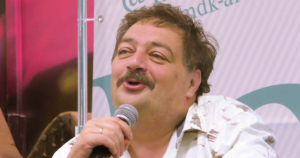
FSB poison squad reportedly targeted prominent poet

Investigative outlet Bellingcat published a long article Wednesday about the previously unknown activities of a group of Russian intelligence officers who poisoned Navalny last year. This time, their target was not a politician but poet Dmitry Bykov, who is well-known for criticizing the authorities. The most surprising thing was not the attempted poisoning (sadly, that’s no longer a surprise to anyone) but the choice of victim.
- On a 2019 trip to the Siberian cities of Novosibirsk, Yekaterinburg and Ufa, Bykov was accompanied by the same team of officers from the Federal Security Service (FSB) that took part in the poisoning of Navalny, according to the Bellingcat investigation. This ‘poison squad’ is from the second directorate of the FSB (responsible for combating terrorism) and the FSB’s Institute of Forensic Science. Several of them had accompanied Bykov on earlier trips.
- The reason for the trip (on which Bykov was accompanied by his wife) was to take part in a ‘Total Dictation’ event. This is a popular activity among Russians — and it sees participants test their literacy by taking down dictation from prominent writers and public figures (Russia remains a very text-centric society). Before his flight to Siberia, Bykov appeared on radio station Ekho Moskvy and talked about why Russians don’t make jokes about Putin (“Because today the authorities are viewed as something alien, otherworldly,” he said).
- After accompanying Bykov and his wife for a few days, the poisoners flew back to Moscow. Bykov first showed signs of illness on April 16, 2019, as he flew from Yekaterinburg (his stop after Novosibirsk) to Ufa. According to Bellingcat, Bykov ate nothing at the airport, but did change his clothes before the flight. Bykov developed symptoms similar to Navalny’s in a similar time frame – roughly 2.5 hours after contact with the allegedly poisoned clothing – but in a milder form. He was hospitalized in Ufa, fell into a coma and required a ventilator.
- Bykov’s friends rallied around and organized an evacuation flight. But the plane was almost turned back “on the orders of the Health Ministry”, reported Bellingcat. Only a flurry of urgent calls from well-wishers managed to overcome the bureaucratic resistance and, on April 18, Bykov was finally transferred to a Moscow hospital. He regained consciousness three days later.
- After the Bellingcat investigation was published, Bykov said it was like “winning a state prize”. He added: “It’s nice to see that my modest activity is worth such lavish expense. Think how many tickets they bought. Although, I’d rather have the money.”
- The fact that the poisoners were reportedly tracking Bykov for more than a year is bewildering, and not just to Bykov himself. Opposition leaders also asked the same question. Bykov does not hide his political opinions — he spoke at opposition rallies in 2011-12, condemned the annexation of Crimea and supported last year’s protests in Belarus — but he is first and foremost a poet and literary critic. There is no opposition group that could reasonably be seen as ‘followers’ of Bykov, and nobody is aware that he has any political ambition.
- Bykov is perhaps best known for his Citizen Poet project, on which he worked with actor Mikhail Yefremov (who is currently in jail after a drunk-driving accident left another motorist dead). Bykov wrote the caustic verses of protest for Citizen Poet, and Yefremov would recite them.
Why the world should care: What happened to Bykov once again proves that it’s impossible to second guess the logic of Russia’s security services. If someone is trying to convince you differently, it’s worth questioning how well this person really understands what’s happening in Russia today.




